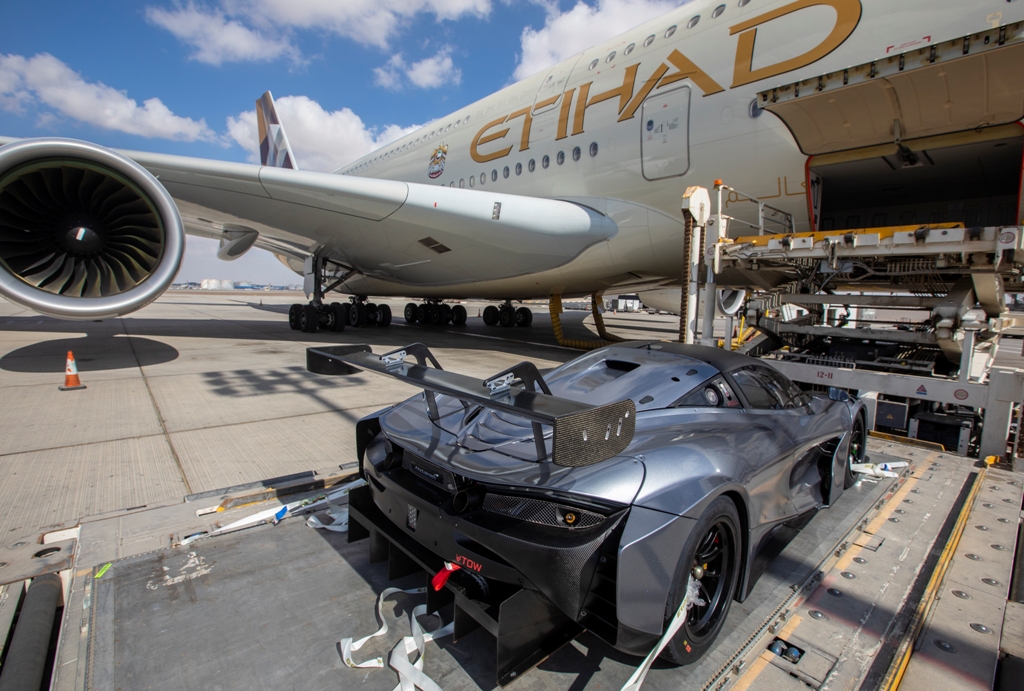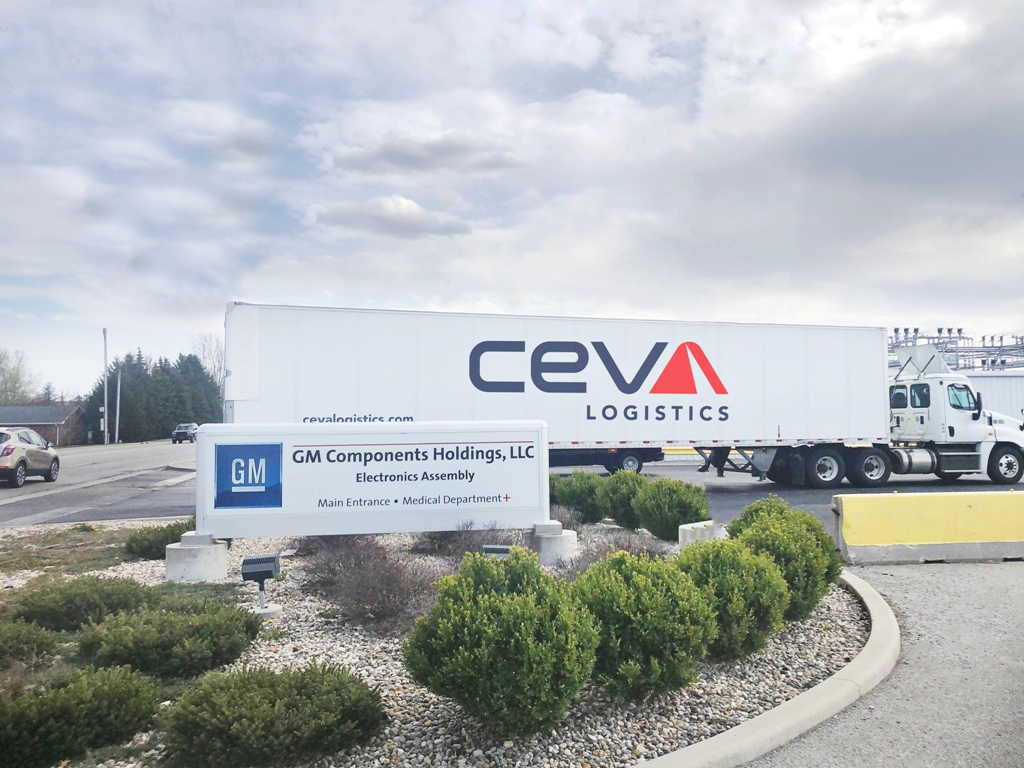Air cargo revs up for changing automotive market
31 / 08 / 2021

Source: Etihad Cargo
The airfreight industry is adapting its solutions to support the automotive sector, as more vehicles on the roads are electrified.
The automotive sector will see more change in the next two years than it has in the last 20 to 25 years, according to Dave Dudek, executive vice president, global automotive and tire sector lead, CEVA Logistics.
“We are just on the fringe of many of these new activities happening. Electric vehicles (EVs) were less than 4% of cars sold last year.
“The industry expects to see 20% compound growth over the next ten years. It will involve far more electronics, drive by wire, control by Internet of Things, all integrated into the vehicle.”
CEVA Logistics offers one of the widest range of services to the automotive sector from inbound to production plants and value-added assembly, to hand carries on passenger flights and airfreight charters.
Dudek says that the amount of moving components in an EV will reduce by 90% compared with existing cars, with more software and semi-conductors required.
“Batteries will be shipped by airfreight only if they have to, but because of their importance to the EVs, we will see a growing need there.
“Batteries are such a critical component and so tied to the design – so we are also seeing quite a lot of use of airfreight in the engineering and testing phase.”
He says that accessing airfreight capacity has been challenging in the last 18 months or so, but “typically you can get capacity of you have good planning and many partners across the industry”.
Around three years ago, Bolloré Logistics decided to accelerate its growth in the automotive industry “to help support the industry through its technological transition”.
It has formed a team of dedicated global experts and is building Competence Centers in strategic locations around the world.
Jean-Philippe Tison, automotive director, explains that “fewer parts and different parts will feature in EV production. The main challenge is linked to the inbound and reverse logistics of the batteries and how to safely handle their transport.
“We will also face other challenges with new suppliers located in different parts of the world that we will have to supply with the same quality of services.”
He stresses that airfreight is a key solution in the Bolloré portfolio: “We offer different services for parts and cars (economic, regular, express) that are managed with our core partners or can be handled by our own services depending on our customers’ needs.
“For the last 14 months, Bolloré Logistics has organised dedicated air charter services with regular flights to cope with the present situation due to the Covid-19 pandemic and operational capacity issues.”
Opportunities for airfreight
Stuart Stobie, director, Priority Freight, admits that while recent months have been challenging in the auto logistics sector, “from a business perspective we are happy to organise airfreight”.
Lack of capacity on ships, a shortage of semi-conductors due to lockdown and delays of four to five weeks on rail freight out of China have all provided good opportunities for airfreight.
“During the pandemic we organised shipments of PPE for our automotive clients as they got production plants up and running again,” he says.
“Any shipments were really hard work – we never knew whether goods would fly and there was no certainty over transit times.”
“Things opened up after first wave. We saw real activity as manufacturers ramped up production and tried to meet targets.
“They were doing anything they could do to keep the supply chains flowing. But road, rail, ocean and air – all were sky high rates as the capacity was never enough.”
He predicts that the biggest disrupter in the short-term will be the crossover when all three types – combustion, hybrid and electric – are all manufactured at the same time.
“EVs have fewer components than combustion, but the supply chain is still relatively tight and fragile. I can’t see airfreight reducing significantly in the near future.
“Provided we have semi-conductor availability, we expect to see very busy September and that it will stay like that until early next year.”
Stobie worked in the parcel industry for 28 years and says they were able to forecast volumes pretty accurately, “but the automotive industry is notoriously difficult to predict and affected by all sorts of things, even weather – such as hurricanes damaging production plants”.
“That moves prices for the supply chain up and down, even in normal times,” he says.
Bernard Lee, Etihad Cargo regional manager in Thailand, agrees that the automotive industry will face “large-scale market disruptions in the next ten years”.
“The disruptions will be mainly due to the increasing interest in EVs over the traditional combustion engine vehicles.
“The result will be a massive shrinkage of number of auto parts required to build a vehicle – from 2000+ parts for the traditional combustion engine vehicle to around 200 components for EVs.
“This will mean changes to current supply chain models as well as a potential shift of production locations to cities with suitable infrastructure for producing EVs.”
Etihad offers a FlightValet service for its automotive customers, including those moving luxury cars around the world on both passenger and freighter flights.
The airline predicts demand may reduce as there will be fewer car shows due to Covid-19 restrictions.
“A focus within the automotive as well as the transportation sector will be the need for CO2 friendly solutions ensuring the sectors will be sustainable for the years to come,” the company says.
The automotive sector is one of the main drivers of growth for time:matters, the experts in time critical express transport founded as a 100% subsidiary of Lufthansa Cargo in 2002.
Lars Krosch, chief operating officer, time:matters, says: “In recent years we have seen a high demand for individual and high-performance transport solutions for OEMs as well as for Tier 1 and Tier 2 suppliers.
“As part of the Lufthansa Group, we combine special access to the capabilities of an airline merged with the capabilities of a door to door forwarding agent.”
He says that premium freight is the plan B for the various disruptions that occur unpredictably.
“Whether it’s the Ever Given incident in the Suez Canal, the blizzard and the heatwave in Texas or low water in China – in a connected world the demand for bypasses is heavily increasing.
“A 23kg box can easily cause a line stoppage for five automotive plants, and the line stoppage costs can be easily between €250,000 to €500,000 and even more, per event.”
The Covid-19 pandemic has been a prime example of disruption. “Since April 2020, air freight has become the main artery for supply chains worldwide.
“First of all, to serve the demand of PPE shipments and in the second stage to ensure the ramp up phase of the economy.”
But the pandemic has also been a catalyst. “Overall, a long-demanded higher level of transparency has been established throughout supply chains (between OEMs and Tier 2 and Tier 3 provider) in a volatile world,” Krosch explains.
“The bottom line is that digitisation and an intelligently networked, transparent supply chain, such as we offer at time:matters, will be the decisive success factor for the logistics of the future.”
Air charter solutions
Neil Dursley, chief commercial officer, Chapman Freeborn, says the majority of work that the air charter broker handles for the automotive sector involved delivering parts to production lines.
“We manage large volumes of product for German auto manufacturers. It’s mainly movements from Germany and Central Europe.
to the US and Mexico, and from China to the US and Europe. The transatlantic route has traditionally been a strong automotive route.”
The Covid-19 pandemic has seen a dramatic rise in the use of on-board carriers (OBC). “Since Q3 of last year, we have been using this to deliver large volume of auto parts all over the globe. On a mostly daily basis for months at a time.”
Initially, there were very few passenger flights, so that was a huge issue. “But there was also a problem with people needing to be quarantined, so we needed to find innovative ways around that.”
Chapman Freeborn would use multiple couriers, so the one arriving would hand goods over to another courier on the ground, and immediately go into quarantine. Once out of quarantine, the first courier was available again to do a flight.
time:matters expands transatlantic same-day service
Antonov transports automotive parts as demand picks up
IAG Cargo reports increased automotive demand
“It is expensive, but auto companies were prepared to pay as it was only way of getting the time critical products they needed. Sometimes we would use a private passenger jet to get parts delivered – especially if it was something small that needed to get to an obscure place.”
Chapman Freeborn is part of Avia Solutions Group, and works closely with its sister companies Magma Aviation and Arcus Air Logistic to find the best supply chain solution for customers.
Dursley says: “We don’t run scheduled services, but we do offer regular services on some routes such as transatlantic. We have about 11 rotations a week operating between Europe and various destinations in North America and lots of them are on behalf of the automotive market.”
Chapman Freeborn works closely with global airline partners but sister company Magma Aviation has increased its own fleet of B-747 -400 freighters from three to five.
He says: “Every week we have large freight forwarders coming to us to ensure they have continuity for clients’ supply chains. They have locked in capacity by buying long-term programmes [beyond 12 months].”

















